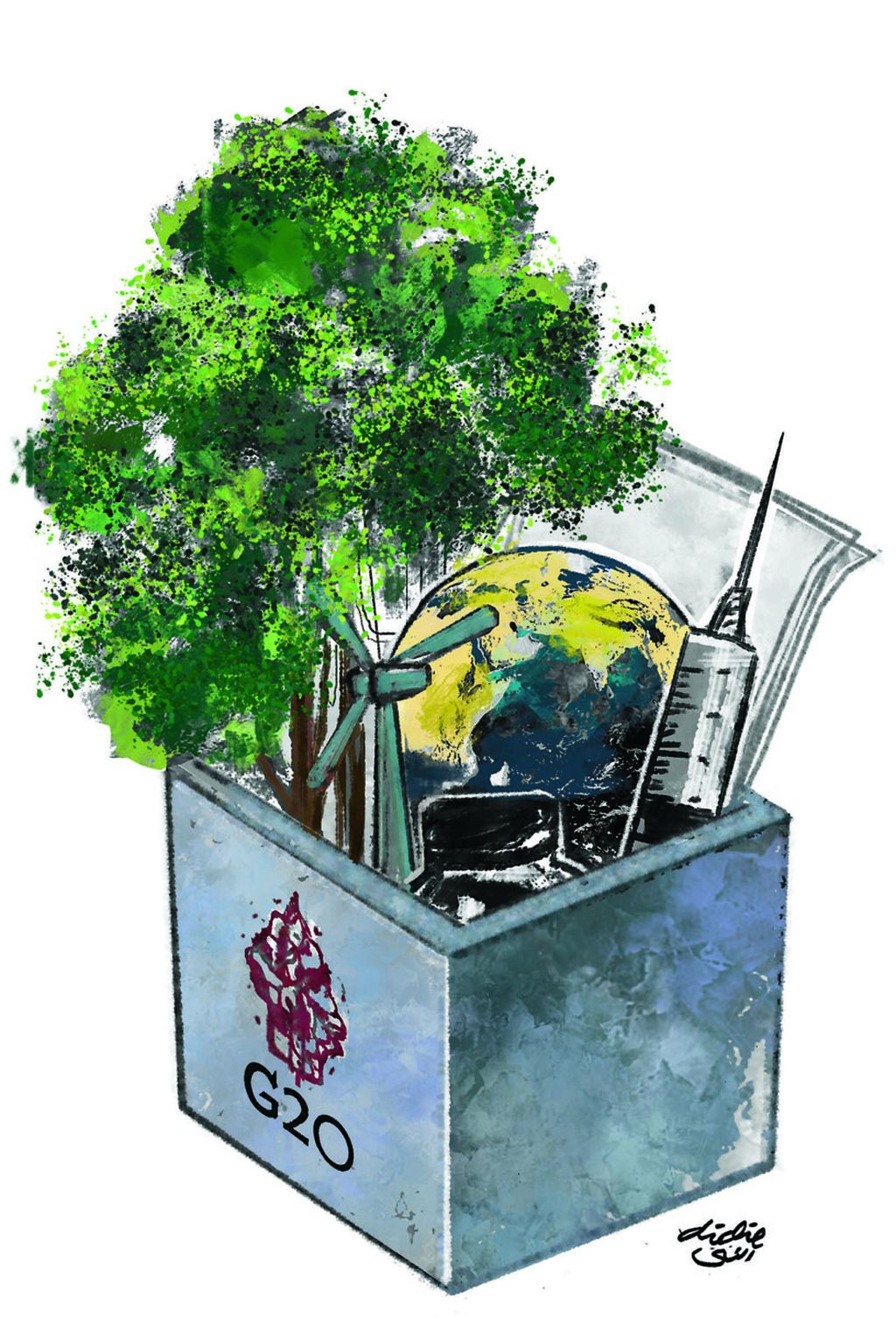Post-G20 Rome Summit Challenges and Opportunities
Indonesia, which proves to have passed the test in various crises, is now being challenged to be more active in the global arena.

A global crisis requires a global solution. This statement by the Group of 20 (G20) leaders at the 2009 G20 Summit in London remains relevant today.
The G20 Summit in La Nuvola, Rome, recently ended on 31 October 2021.
The leaders declared a consensus of 61 paragraphs divided into 27 issues, ranging from global economic dynamics and determinants of the economic recovery, health, education, sustainable development and finance, infrastructure, energy and climate change, food security and nutrition, financial inclusivity, women's empowerment, transportation, tourism, anticorruption and data gaps through to social protection. What are important agendas and for the Indonesian presidency and the significance of the nation taking this role?
Major global issues
The G20 Rome Summit has reminded us that there are at least three major global issues that need attention.
The first is vaccination access and rollout speed. Vaccination rates in developed countries and some developing countries are already high, ranging from 60 to 80 percent for developed countries, and 25 to 40 percent for developing.
However, in poor countries, especially in Africa, the vaccination rates are still below 10 percent, some only reaching 3 to 5 percent.
This shows that the risk of Covid-19 transmission remains high and has the potential to affect the world. Since vaccinations are believed to be a determining factor in the economic recovery, G20 countries are pushing for vaccinations to be ramped up.
It is hoped that the vaccination process will reach 40 percent of the world's population by 2021 and reach 70 percent by mid-2022. This challenge requires strong global commitment to cooperation.
Second is the challenge related to inflation and global supply chain disruption. This has occurred as a number of countries have made a rapid economic recovery, which has resulted in increased demand for various products, but the production capacity has been disrupted by the pandemic.
Also read:
> The G20 and Global Economic Governance
Rising commodity prices, particularly energy, have required countries to recalculate their state budgets and subsequently their spending capacity on health, social protection and economic recovery.
Third is the issue of digital technology and climate change. Digital technology will push the acceleration of digital transformation that focuses on production, processes, services and business models.
Digital transformation is the backbone of the development of the digital economy, which is believed to drive the growth of various sectors and encourage economic recovery. However, there are still debates, including those related to security, privacy, intellectual property rights and data protection.
On the other hand, climate change is a megatrend issue that became a major concern following the 26th United Nations Climate Change Conference (COP26) in Glasgow, Scotland, the United Kingdom. In the lead-up to COP26, the issue of climate change was among the topic agenda at the Rome Summit.
The global target for reducing emissions has been a prolonged debated topic, especially regarding the capacity of countries, the funding commitments of developed countries and the domestic priorities of each country.

Didie SW
Implementation challenges
There are at least three challenges in implementing the G20 consensus. First is the global leadership, which is supposed to be the main orchestrator in carrying out all agreed international cooperation commitments, especially in overcoming the health and economic crisis caused by the Covid-19 pandemic.
Consensus implementation tends to be influenced by global geopolitical policies and the commitments of developed countries. The handling of health problems in developed countries is very different from that carried out in low-income countries (LICs) and developing countries, which still face many constraints.
Global cooperation is urgently needed to prevent the increase in deaths in many countries caused by the spread of the new variant of Covid-19 and to mitigate the imbalanced economic growth.
Second is the need for alignment between the commitments pledged in international forums and the coordination of domestic policies.
Differences in focus, strategy and expectation potentially emerge among the relevant ministries and institutions, as well as the coordinating organizational unit. They need to align the policy narrative and its implementation plan.
In the Indonesian context, international commitments are important to align with ongoing structural reforms.
Also read:
> G20 and the New Social Contract
> Through G20 presidency, Indonesia Ready to Manage Rivalry of World Powers
The third are the challenges related to digital transformation and climate change, as to how to take advantage of the digital transformation to boost productivity and distribute the benefits inclusively to help economic recovery, and how to oversee the digital transition process.
The G20 Menu of Policy Options on Digital Transformation and Productivity Recovery has provided guidelines for policy focus.
On the other hand, it is deemed necessary to strengthen the narrative at the global level on the issue of climate change so that the transition to a green economy and low-carbon development in LICs and developing countries can be enforced based on justice and affordability.
Being just means taking into account the stage of development between developed countries and LICs and developing countries, the legal aspect (the completion of contracts in the energy sector, such as coal phasing out), potential but unexploited assets and funding capacity.
The issue of affordability is closely related to the purchasing power of the people. Ignoring this issue might cause people to lose their jobs, which can subsequently have an impact on society and national stability.

Supriyanto
Global leadership
The high dynamics in the geopolitical constellation aside, global leadership in the Covid-19 pandemic mitigation campaign and the economic recovery promotion is urgent.
Indonesia needs to be active in voicing the urgency of a joint global movement to overcome the Covid-19 pandemic and encourage economic recovery.
Indonesia must be able to optimize its three credentials, namely the G20 presidency in 2022, ASEAN chairmanship in 2023 and the role of the finance minister in the Coalition of Finance Ministers for Climate Action.
The merit of Indonesia’s G20 presidency for 2022 is at least the ability to manage the agenda setting and the opportunity to showcase development achievements.
Indonesia can continue to voice the importance of global action to restore the economy and become a balancing voice for developing countries.
The main agenda for the 2022 G20 presidency, both in the finance track (economic and financial issues) and the sherpa track (covering broader issues outside the economy and finance: energy, development, digital economy, education, labor, climate change, etc.), can be harmonized with other multilateral cooperation.
The theme for the 2022 G20 presidency is "recover together, recover stronger", which is very relevant to the priorities of ongoing international cooperation.
Also read:
> G20 Summit Not Satisfactory, Climate Issues Burden at COP 26
> The World Awaits Emissions Reduction Action
Indonesia's role as the chairman of ASEAN in 2023 is the coordinator to maintain regional economic and financial stability, as well as in handling the health crises, economic recovery and the pursued structural reforms for sustainable development.
The role of the finance minister in the Coalition of Finance Ministers for Climate Action is an important opportunity to lead discussions, share experiences and capture the opportunities for climate change funds for investment, especially for developing countries.
Another focus is how to capture the global investment opportunities. In addition, bilateral cooperation with international financial institutions (IFIs) also needs to be encouraged.
Good communication with IFIs (the World Bank, Asian Development Bank, Islamic Development Bank and Asian Infrastructure Investment Bank) as well as bilateral partners during 2020 has borne optimal benefits with Indonesia having received financial support for handling the Covid-19 pandemic in the form of a fast-track program worth US$ 4.5 billion.
This well forged coordination and relationship, which shows Indonesia’s position on the Covid-19 pandemic mitigation map, can also be used as a lessons-learned experience worth being shared with other countries in their efforts to obtain technical assistance in terms of capacity and knowledge building.

Wempi Saputra
The agreements made at the close of the G20 Summit in October will carry over to Indonesia's G20 presidency. The meeting of the G20 deputies in Bali in December this year will be the initial benchmark for how Indonesia manages and optimizes this multilateral action to voice, encourage and benefit from the acceleration of national economic recovery and improve the welfare of society in general.
Indonesia, which proves to have passed the test in various crises, is now being challenged to be more active in the global arena. Only through synergy and collaboration will Indonesia be able to meet its aspirations to overcome the next challenges for mutual goodness.
Wempi Saputra, Expert Staff to the Finance Minister for Macroeconomics and International Finance; G20 Finance Deputy
This article was translated by Musthofid.